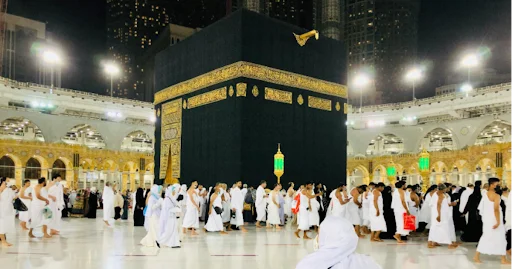What are the Major Differences Between Umrah VS Hajj?
Hajj and Umrah offer you the opportunity to be the guest of Allah Almighty and a chance at redemption. There is nothing more rewarding and surreal than this for the Muslims. Even though both pilgrimages require you to travel to the sacred house of Allah Almighty, they have some differences. Understanding the key differences between Umrah vs Hajj in Islamic teachings is very important if you are planning to perform the pilgrimage soon.
Both Hajj and Umrah are performed to show your devotion to the Creator. Muslims understand the significance of the faith revival that these two pilgrimages promise. But there are some significant differences that every pilgrim must know, and we are here to tell you everything about them. You can learn the differences between the two pilgrimages by enrolling in courses by Mahad Al Islami Lil Banat.
Hajj vs. Umrah: How Two Pilgrimages Differ
There are numerous ways in which Hajj and Umrah differ. Let’s tell you about some of the most prominent ones.
Obligation and Religious Status
One of the primary differences between Hajj and Umrah is the obligation and religious status of both pilgrimages. Hajj is an obligation of Muslims to the Almighty, which is not the case with Umrah. Umrah is the voluntary pilgrimage that Muslims can perform for exceptional spiritual rewards. In the Holy Quran, Allah Almighty has made it obligatory for all the financially and physically capable Muslims to perform Hajj, as is evident in the verse below:
“And [due] to Allah from the people is a pilgrimage to the House – for whoever is able to find a way. But whoever disbelieves – then indeed, Allah is free from the need of the worlds.”
(Surah Aal-e-Imran, 3:97)
Every year, thousands of US Muslims travel to Makkah for Hajj to fulfill their obligation to the Almighty. After reading this verse, if you want to go for Hajj soon, you must start looking for Hajj packages from the USA.
Umrah is not obligatory but is a Sunnah Mu’akkadah, which means that it is a highly recommended practice. You can perform it for its immense spiritual rewards without it being a binding duty.
Timing and Season
Timing is the other difference between Hajj and Umrah. Hajj must be performed on the specific days of a particular Islamic month. This pilgrimage is performed in the first ten days of the last month in the Islamic calendar, Dhul Hijjah. You will have to follow the prescribed sequence of days during this pilgrimage.
On the other hand, the timing and season for Umrah are different. There are no seasonal restrictions for the minor pilgrimage. You can go for an Umrah at any time of the year. This pilgrimage is perfect for those who cannot visit during the Hajj season, but it is essential to keep in mind that if you are eligible for Hajj, you must also perform it as soon as possible. Do you want to perform this voluntary pilgrimage soon? If so, it is time to start looking for Umrah packages and join the fortunate USA citizens going for the pilgrimage soon.
Ritual Differences
Although some rituals of Hajj and Umrah are similar, Hajj encompasses a broader range of rituals beyond those performed during the minor pilgrimage. Both pilgrimages require you to be in the state of Ihram, perform Tawaf around the Kaabah, and walk between Safa and Marwah. Although Umrah is completed with these rituals, Hajj rituals are much more extensive, requiring more time and effort.
Some additional rituals of Hajj are listed below.
- Standing at Arafah (Wuquf) on the 9th of Dhul-Hijjah is a pillar without which Hajj is invalid.
- Spending nights in Muzdalifah and Mina.
- Performing Ramy al-Jamarat (stoning of the devil).
These rituals are not part of Umrah, making it less physically demanding and shorter in duration.
Duration and Effort
As we have already mentioned, Hajj requires a few days, five to six days on average, and is more physically demanding. You will be required to walk long distances, do overnight stays at the sacred sites, and be a part of huge gatherings during this pilgrimage.
On the contrary, Umrah can be performed in a few hours and doesn’t require as much physical activity. But this doesn’t mean that you cannot spend more time at the sacred sites. Umrah pilgrims also stay in Masjid al-Haram and other holy sites, immersing in various acts of worship and spending time on self-reflection.
Spiritual Rewards
There are endless rewards of both Hajj and Umrah. Hajj promises a complete spiritual cleansing that enables you to get rid of all your past sins and start your life anew. The Hadith of the Holy Prophet (SAW) shows that Hajj cleanses the soul and makes you pure like a newborn.
“Whoever performs Hajj for the sake of Allah and does not have sexual relations (with his wife), nor commit sin, nor dispute unjustly during the Hajj, will return like the day his mother gave birth to him.”
(Sahih al-Bukhari, Hadith 1521; Sahih Muslim, Hadith 1350)
Umrah also has exceptional spiritual rewards. It also brings forgiveness and countless spiritual rewards. Here is another heartwarming Hadith that provides an insight into the rewards of Umrah.
“The performance of Umrah to Umrah is an expiation for the sins committed between them.” (Sahih al-Bukhari, Sahih Muslim)
Summing Up
Hajj and Umrah can transform your life. Now that you have got an idea about the differences between the two pilgrimages and have figured out your budget and availability, it is time that you decide which pilgrimage you will be performing soon. You can contact a reliable Islamic travel agency to help you plan a seamless Hajj or Umrah from the USA.








